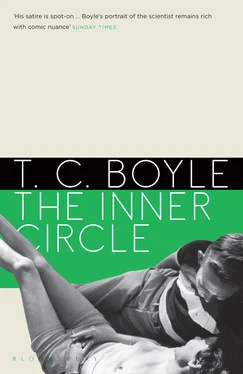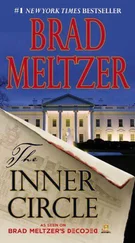The girl — Betty — watched the entire transaction, the nod in her direction, the dual handshakes, the fading expressions of Elster and Skittering, even as her friend turned to look over her shoulder and I weaved my way across the room to her, glass in hand. I didn’t know what I was doing really, just that I was extricating myself from an awkward situation, and that, as much as anything, impelled me toward her. “Hello,” I said, sweeping the hair away from my forehead with my free hand as I swayed over her, “remember me?”
Her smile was glossy, her lips pulled back tightly over her teeth, and forgive me if I couldn’t help picturing those lips as they stretched wide to receive Corcoran, that heroic motion, in and out, and the tissue there glistening with fluids. “Yeah, sure,” she said, and she slid over and patted the seat beside her. “Here, take a load off. Come on.”
I eased in beside her, a quick glance for Elster and his companion, who were fixed on me like birds of prey, and the olfactory memory of her came back to me in a rush, that perfume, the heat of her body, the smell of her hair.
“This is Marsha,” she said, indicating the friend across the narrow table (spaniel eyes, the face of Stan Laurel, a frizz of apricot-colored hair), “and what was your name again?”
My name was John. And I gave it to her. And I gave her her smile back too.
The waitress was there and she asked if we wanted to see a menu. The girls’ martini glasses were empty. Betty wanted another drink and she thought looking at the menu might be a good idea. The friend claimed that the one drink had gone to her head, and she didn’t know, but sure, what the hey, she’d have another. That was fine by me, though I didn’t have a whole lot of cash on me, because I’d planned on a couple of drinks, a bite to eat, and then a five-point-two-mile hike, and nothing more. Iris was at home, big as a house. The house was at home, bigger than a house. I ordered another beer and Betty told the waitress to bring her a porterhouse steak—“rare to bloody”—with fries and a house salad with Thousand Island dressing.
After that the three of us beamed at one another for a while and we talked about Bloomington, how endlessly, hopelessly, stuporifically dull it was, and we talked about movie stars — John Garfield, wasn’t he disgusting, or raw or whatever you wanted to call it? — and our travels, such as they were. Both girls were mad for New York, though as it turned out neither had been there, and I suppose it was only natural that I should play up my experiences there and maybe even embroider them a bit. Then the steak came and the friend left — she had to be up early in the morning — and when I glanced over my shoulder Elster and Skittering were gone too.
“So are you married?” the girl said.
“No.”
“Then what’s that on your finger?”
“This?”
“Yeah, that. ”
“It’s a wedding ring.”
She dropped her eyes to the plate a moment, the knife, the fork, cut a wedge of steak and looked up again as she tucked it between her lips. “Divorced?”
“Does it matter?”
She shrugged, dropped her eyes to the plate again.
“What about you,” I said. “Are you — and please don’t take this the wrong way — are you, well, a professional ?”
She was chewing thoughtfully, slowly, her eyes reemerging now to lock on mine. “What is this — another interview?”
“You mean you already—?” I made a mental note to go to the files in the morning and violate our code of anonymity yet again. “Who was it, Corcoran?”
“Yeah,” she said, “Purvis. He’s a great friend of mine, you know that, don’t you?”
I wasn’t very good at this, but the liquor was in my veins and liquor always made me feel unbeatable. “I gathered that,” I said. “From the last time I saw you.”
She ignored me. Went for the steak again. Picked up a french fry and licked the salt from it with quick pink stabs of her tongue before folding it into her mouth. “No,” she said, “in answer to your question. I’m not a professional, whatever that means. I don’t take money for it, if that’s what you’re asking, and that’s down on the interview sheet too.”
I was getting the defiant look now, the look she’d given us all when we were milling around Prok’s living room trying to summon the courage to get on with what we’d come for. “I like men,” she said. “Is that a crime?”
“No,” I said, “that’s no crime at all.”
And then we were both laughing, laughing to beat the band, as they say, and in the throes of it she put a hand on my thigh to steady herself. The jukebox — I wasn’t even aware to this point that it had fallen silent — roared back to life with something that had plenty of jump to it and we let the laughter trail off even as we began to feel the beat vibrating through the tabletop and the glasses in our hands and the seat of the bench we were sharing. People around us got up to dance and my fingers, independent of thought, began to tap out the rhythm. I was thinking I should ask her to dance, though I wasn’t much good at it, but instead I said, “So what do you do — for a living, I mean?”
She turned her face to me, a blue sheen of neon caught in her hair. “I’m a nurse,” she said.
“Oh, really? Well, that’s — that’s terrific. It really is. A nurse, huh? That must be — interesting.”
“You’d be surprised,” she said, looking out over the room before her eyes came back to mine. “But you know what?”
“What?”
“You know what I really like? After a good meal?” She leaned in close, so that her forehead was nearly touching mine and I could smell the gin and her perfume and the meat on her lips.
“No,” I said, “what?”
“You can’t guess?”
Iris went into labor on June the twentieth, just after dinner. She’d experienced mild contractions the day before, and there had been blood in her vaginal secretions that morning, followed by a discharge of bloody mucus, normal precursors to the rupturing of the amniotic sac and the imminent birth of the child. Though I’d been unconscionably ignorant of the whole process (witness my question about the kicking of the baby, which even the most untutored or oblivious should know doesn’t occur until the sixteenth week), Prok had encouraged me to educate myself, not only for “my own benefit in apprehending the life process,” as he put it, but in improving my ability to relate to our female subjects as well. And he was right: now I knew what they went through, what they were afraid of, how the pleasure of the act was followed by the pain of disclosure, abortion, the throes of birth. Though he’d never been busier or more harassed, Prok took the time to quiz me each week on Iris’s condition — the swelling of her breasts, the appearance of the linea nigra drawn like a dark chalk mark over the hump of her abdomen, the dropping of the fetus, the widening of the cervix — and made a little lecture of it every step of the way. Terms like “blastocyst” and “human chorionic gonadotrophin,” “endometrium” and “progesterone,” which I’d probably copied into a notebook somewhere in Intro to Biology and promptly forgotten, became as familiar to me as the baseball scores in the morning paper.
We were lucky, really. We had not only the benefit of the literature on the subject (including an excellent and very thorough new book by Benjamin Spock, a Columbia University M.D.) and the experience of Dr. Bergstrom, but the advice of Iris’s mother as whispered through the long-distance lines and all the support Prok and Mac could give us, Mac especially, who spent hours at the house, knitting, baking and just chatting away with Iris in her soft glutinous tones as if Iris were one of her daughters and the baby out of her own bloodline. My own enthusiasm, as I’ve said, tended to vary day to day, but there was something of the inevitable in the process and I found myself submitting to the pull of it. And I was informed. At least there was that.
Читать дальше












